Review: The Penny Seats Theatre Company's Canterbury Tales
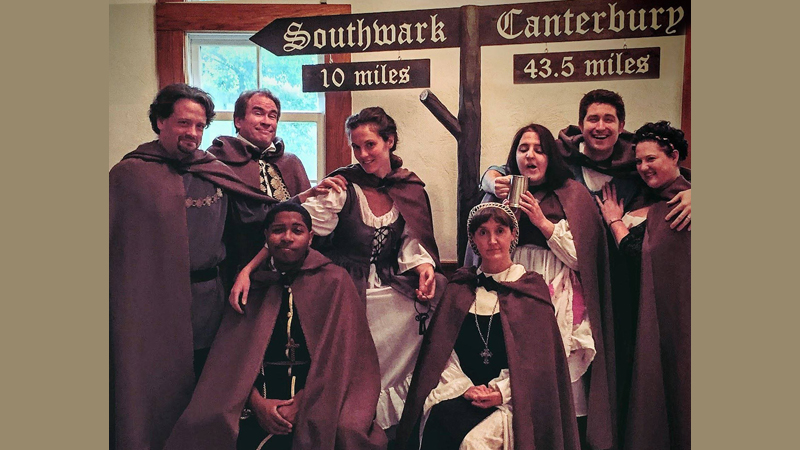
We’re all pilgrims, in a sense, finding our way around the hairpin twists and bumps in our life’s path. Maybe this is why Geoffrey Chaucer’s 14th century writings about a group of pilgrims traveling to Sir Thomas Becket’s shrine still endure.
Or it could just be because The Canterbury Tales – adapted for the stage by Lindsay Price, and now being staged (outdoors) by Ann Arbor’s Penny Seats Theatre Company – are often laugh-out-loud funny, and demonstrate that hundreds of years ago, people had many of the same desires and fears that we have have now.
One basic human drive was, and remains, storytelling, which Chaucer’s pilgrims employ as a means of distracting themselves during the journey. For Price’s stage version of Canterbury, the pilgrims have been distilled down from about thirty, in the original Middle English text, to seven: the Pardoner (Brian Baylor), the Miller (Matt Cameron), the Franklin (Dale Dobson), the Cook (Jenna Hinton), the Prioress (Tina Paraventi), the Wife of Bath (Debbie Secord), and the Reeve (Jeff Stringer) – plus an inn’s hostess (Jennifer Sulkowski), who tags along and suggests that the pilgrims compete in a storytelling contest.
I’ll pause a moment here while you Google the definition for “Reeve” and “Franklin,” as I needed to do.
Director Anne Levy stages the production on the walkway in front of the West Park band shell, so patrons sit on blankets or lawn chairs in a tiered, grassy space. (Many brought a picnic dinner, and some snacks and drinks are available for purchase; sunglasses, a hat, and sunscreen are recommended, since the sun can be pretty intense for the show’s first hour.)
Using little more than costume props and small, stackable wooden benches – in a way, Penny Seats’ Canterbury hearkens back to theater at its simplest and most pure – the spirited troupe re-enacts six of Chaucer’s most memorable tales, employing music and small bursts of audience interaction/improv for set changes. And while a couple of the stories feature bawdy sexual situations and crude acts, Price’s adaptation, paired with Levy’s direction, suggest instead of show. (It also makes some textual adjustments, so that the Nun’s Priest’s tale of a rooster and a fox is told instead by the priggish Prioress.)
Levy’s ensemble works together beautifully, occasionally working in contemporary references for fun. (Following the line, “The truth is out there,” there’s a mumbled reference to Agent Scully.) And Price’s choice to have the pilgrims re-enact the tales results in many opportunities for the players to shift accents and personas. Some don’t make sense – a New Yorker? – but they’re not supposed to. The shifts underline the fact that this is all just a bit of silly fun.
Hinton earns big laughs as the self-doubting cook who’s too cowed to tell a story; Secord plays an appropriately bold, unapologetically straight-shooting Wife of Bath (and an even funnier hen); and Stringer, as the touchy Reeve, anchors the production, stepping into many roles with no-holds-barred zest.
With a running time of just over two hours, with one intermission, Canterbury doesn’t exactly feel fleet, despite the cast’s best energy and efforts, so it’s ultimately more pleasant than thrilling. But given the relaxed vibe of the venue, and the quality of the production, there’s no reason why Penny Seats Theater – alongside Shakespeare in the Arb – shouldn’t become yet another beloved outdoor theater tradition in Ann Arbor.
Jenn McKee is a former staff arts reporter for The Ann Arbor News, where she primarily covered theater and film events, and also wrote general features and occasional articles on books and music.
The show runs Thursdays, Fridays, and Saturdays until July 2 in Ann Arbor's West Park. Tickets are available online.
Review: Purple Rose's Morning’s At Seven mines gentle humor in family conflict
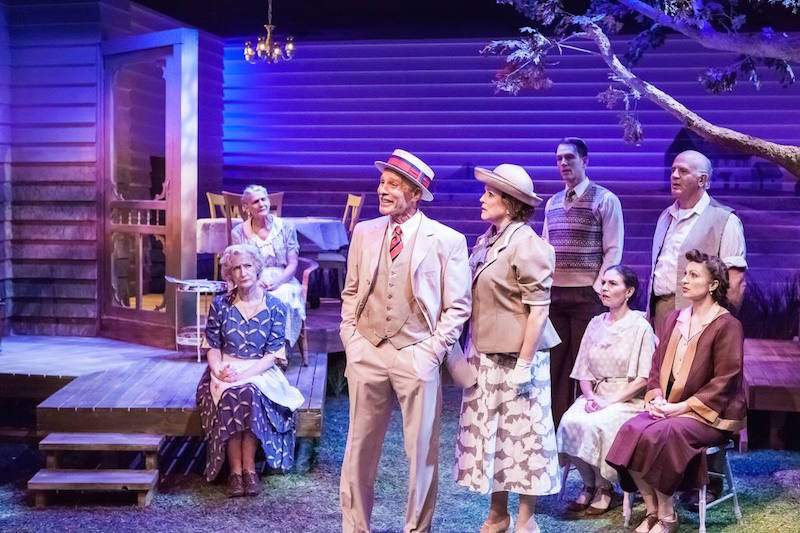
Paul Osborne’s Morning’s At Seven treads lightly on themes of personal disappointment, repressed feelings, and unrelieved tension in a small town Midwest.
Osborne’s sympathy for this world out-of-sync is given a respectful and well-performed staging by the Purple Rose Theatre in Chelsea. Osborne, who grew up in Kalamazoo and went on to great success as a playwright and screenwriter, creates gentle comedy from material and settings that William Inge would later turn into steamy drama in Come Back Little Sheba, Picnic and other works.
Osborne’s approach is low-key and knowing and director Michelle Mountain captures that tone and the sometimes bittersweet nature of Osborne’s comedy. The staging also evokes through set, music, and soft lighting the particulars of place and time, 1938.
Morning’s centers around four sisters who live near each other in a small, rural Midwestern town. They are getting up in years, the oldest is 72 and the others are in their 60s. Their ambitions have been small, home centered, but underneath are disappointments never openly expressed.
Cora lives with her husband Theodore, called Thor, and her younger never-married sister Aaronetta Airie. Next door is sister Ida, whose husband Carl has mental-emotional problems. Their son, the well-named Homer, is 40 and has never left home. A few blocks away is Esther. Her husband David is a retired professor who disdains his wife’s family and openly dismisses them as a pack of morons.
The quiet disruption that motivates the play is provided by Homer, who brings home his girlfriend of many years, Myrtle. He visits her in the city but has never introduced her to his family. He’s never asked her to marry him and he’s never moved into the house that his father built for the couple.
Homer suffers from the same doubts and lack of confidence that torture his father. Meanwhile, the house sits empty and Aunt Cora wants it.
What makes this work to some extent is actors who can delve deeply and sympathetically into the motivations, pains, and sly humor of these characters, who in the hands of a lesser playwright and/or a less focused cast could become rube stereotypes ripe for contempt.
At the heart of the play is Aaronetta, the “old maid.” Laural Merlington gives an outstanding performance of this feisty, righteous woman. She captures all of Airie’s contradictions from her warm-heartedness to her suspicions, nervousness, and repressed desires. This is a complex character and Merlington does a fine job of finding all the shadings that make her live as a real person.
Airie’s pain comes from her lifelong love for her brother-in-law Thor. Richard McWilliams makes that affection seem well placed in his performance of a fine, well-centered, decent man. McWilliams captures his warmth, quick empathy and sly sense of humor. Thor is the rock-solid middle American but McWilliams lifts him beyond any easy stereotype as he maneuvers through the most dramatic sections of this comedy. His face and his voice fit exactly who this man is.
Ruth Crawford is Cora, a nervous bundle of a woman. Crawford gives the character’ s desperation to have a life of her own real credence and empathy even as she stubbornly holds her ground.
Rusty Mewha plays Homer as a repressed man-child, unsure of who he is, what he wants or how to live in a world that confuses him. He is socially inept and seemingly sexually repressed. Mewha squeezes a lot of humor out of Homer’s stiff cluelessness.
Homer’s parents have other problems besides home-hugging Homer. Carl thinks he’s a failure because he never became a dentist, though he is a talented craftsman who has built houses. Hugh Maguire plays Carl as a man in a daze - a man who can’t quite connect, even or especially with his wife. Franette Liebow is atwitter as Ida, a nervous woman not quite sure what she wants. She gives sympathy to a less defined role.
Esther and David live in a slightly different world a few blocks away, the world of books, ideas, and attitudes. Esther dresses better, has a more stylish hairdo, even talks in a more refined way. Susan Craves gives all these nuances to her performance as the oldest sister. It is she who finally brings order at the end. Tom Whalen is the arrogant, demanding, and clueless academic David. Whalen plays David as a man who sees himself as a charmer and a giant among intellectual pygmies.
Rhiannon Ragland has the thankless role of Myrtle. The audience wonders how she could ever put up with Homer for 12 years in their peculiar relationship. But Ragland does well at finding the unhappiness Myrtle pushes deep inside even as she repeats again and again how happy she is.
Set designer Sarah Pearline has created a simple but charming backyard with a farm field visible in the distance. Suzanne Young’s costumes aid in quickly defining the characters and the time period. Reid Johnson’s lighting also captures the mood.
Morning’s At Seven is a small, character-driven play. Its humor is low-key, drawing chuckles and wry smiles. There is no great drama and the ending seems a bit flat. But the play has found an audience many times on Broadway and at regional theaters because of its respect for and insights into small town characters. The Purple Rose production understands those strengths and does them honor.
Hugh Gallagher has written theater and film reviews over a 40-year newspaper career and was most recently managing editor of the Observer & Eccentric Newspapers in suburban Detroit.
Mornings At Seven continues at the Purple Rose Theatre in downtown Chelsea, Wednesdays through Sundays through August 27. For information, call the box office at (734) 433-7673 or visit http://www.purplerosetheatre.org .
Preview: German Park Kicks Off its 78th Year!

The first German Park picnic of 2016 is coming up on June 25. German Park is one of Ann Arbor’s longest running, yet in some ways still lesser known, summer traditions. For over 75 years, the German Park Recreation Club has been throwing summer picnics on the last Saturdays of June, July and August. They started in 1938, when a group of German immigrants pooled their money together to purchase the land for the park off of Pontiac Trail. Many attendees have been going every summer for their entire lives! Native Germans or those who have been to Germany, often comment on the authenticity of the atmosphere, cuisine and performances at German Park. Whether you claim German heritage or not, these picnics are a wildly fun and festive display of German culture.
It’s best to arrive at German Park early, as the lines to get in grow steadily over the course of the evening. The doors officially open at 4 pm, and after passing through the front gate and paying the $5 admission fee (kids 12 and under are free), the die-hard picnic-goers rush to claim the prime spots at the community dining tables. It’s a universally acknowledged rule that if a table has a tablecloth thrown over it, it’s spoken for. You'll see people clutching tablecloths, blankets, or bedsheets, eager to snag a spot close to the music or in the shade. There’s plenty of room, though, people are friendly and accommodating, and the traditional German music can be heard throughout the park so there really are no “bad” seats in the house.
Food and drink tickets are sold for $1 each at locations around the park, and it’s wise to stock up on them. German Park still serves the same home-cooked, authentic German fare that was served at their first picnic in 1938 and the kitchen or “Deutsche Küche,” is open all evening. From bratwurst and knackwurst (a spicier version of bratwurst) to sauerkraut, spatzen, giant soft pretzels, and apple strudel, the very smell of the food at the picnics is enough to make your mouth water.
Of course, it wouldn’t be a true German festival without beer, and beer there is. It’s served in white plastic buckets; another German Park tradition is to buy enough beer to make a bucket tower on your table. The German Park Recreation Club actually imports wine and beer from Germany for the event, so German beers Spaten, Spaten Optimator and Franziskaner are available, along with a selection of domestic brews.
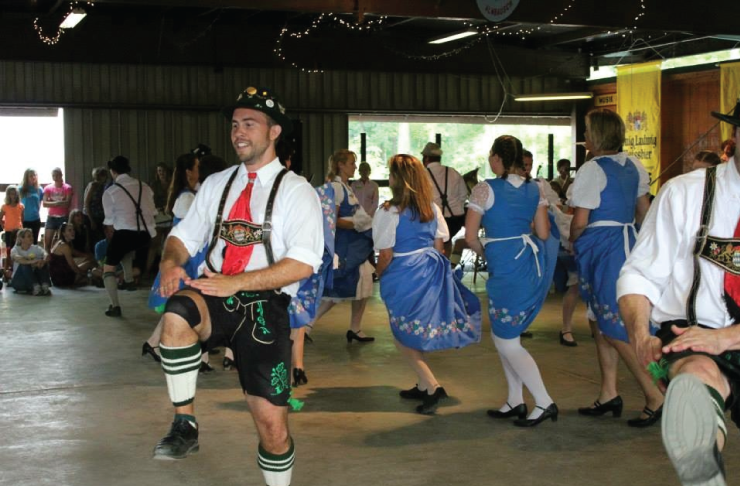
The music and dancing are another highlight of the picnics. Wearing traditional German outfits, the German Park Trachtengruppe dancers perform twice at every picnic, at 6 and 8:30 pm, wowing the crowds with complex dances despite the restrictions of their elaborately embroidered lederhosen and dirndls. In between performances, bands play German music and picnic-goers are welcomed onto the large dance floor.
For the June 25 picnic, Immigrant Sons, a spirited four-person group, will play a variety of German tunes. Later in the summer the Bavarian Showtime Band and Enzian will entertain the picnic crowds.
For more information about the event, including directions, parking, and the designated driver program, visit the German Park website.
Elizabeth Pearce is a Library Technician at the Ann Arbor District Library and is proud to be one-eighth German!
The 2016 German Park picnics will take place on June 25, July 30, and August 27. Admission is $5 for adults and free for persons serving in the military and for children 12 and under. The event runs from 4-11 pm.
Review: Spin at Theatre Nova
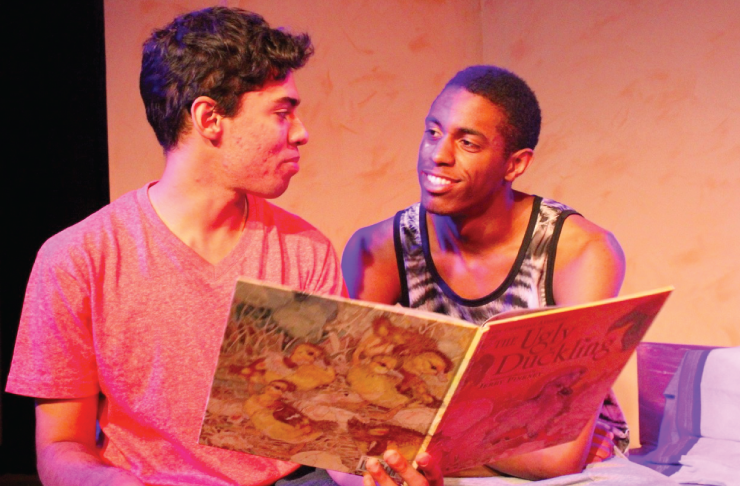
Mila – a gay, black/hispanic teen in Emilio Rodriguez’s Spin, now having its world premiere at Theatre Nova – greets the enrichment programs at his homeless shelter, as well as the world outside, with measured skepticism.
“They try to get you with the root beer floats. Then you have to learn something,” he says.
Yet his new roommate, a more trusting Latino teen named Angelo (Jose Martinez), feels differently. “Poetry is dope,” he says weakly, like a little brother who’s been caught cuddling a teddy bear.
The young men vacillate between vulnerability and guardedness with each other throughout the show’s 80-minute run time, gingerly navigating a minefield of masculinity. Both spin self-defensive lies as well as rhymes: Angelo with his verses – which he presents to the audience between scenes, thus providing the play’s connective tissue – and Mila with rap.
But Rodriguez’s script also takes pains to remind you how young and naive these two characters are, despite their hard pasts and bluster. Mila explains, for instance, that if he ever has kids, of they were misbehaving, he’d simply tell them to knock it off. “They’ll stop, and they’ll be grateful I stayed,” he says. (This got a pretty big laugh on opening night.) And when Angelo explains that he has an alternate identity he adopts in moments of stress, Mila settles in to watch the transformation, as if expecting an act of magic to occur. In these moments, we know they’re just boys grown tall.
Daniel C. Walker designed the show’s set, consisting of little more than a back wall with a window (through which Mila sneaks out, returning later with handfuls of crumpled-up bills), two angled beds, a small, shared nightstand, and mini-dressers; Alona Shewach designed the props, keeping in mind what items these adrift young men might each choose to keep from their past. Indeed, the modest, spartan nature of the entire space makes the opening scene work, since Mila gets angry at seeing Angelo’s duffel bag on “his side.”
These two don’t feel they have a claim on much space in the world, so Mila’s become accustomed to fighting to keep the little bit he’s granted.
Walker also designed the show’s lights, which mainly shift from room scenes to Angelo’s poetry readings. (Sound designer Carla Milarch provides an aural backdrop for these readings.) But it’s Rodriguez’s funny, thoughtful script, and the performances that director Kennikki Jones gets from her actors, that ultimately make Spin a winner.
Martinez and Matthew Webb play off each other beautifully. From the start, there’s a profound contrast in their vocal cadence and posture and movement. Webb, tall and lean, initially armors himself with anger and cynicism, while Martinez conveys a more softspoken openness that slowly chips away at Mila’s walls. When Mila finally trusts enough to ask Angelo to read to him, you know that a significant milestone has been reached.
And Rodriguez is skilled enough to both earn it and avoid a too-easy ending. Though some of the play’s interludes felt like padding, instead of a means of providing new insights into the characters and their situation, I nonetheless felt a real sense of discovery regarding this Detroit-area playwright.
Plus, in the wake of the heartbreaking massacre in Orlando, wherein Mila and Angelo would have been among those targeted, it just feels right to stop talking for a while and instead listen closely to what they have to say.
Jenn McKee is a former staff arts reporter for The Ann Arbor News, where she primarily covered theater and film events, and also wrote general features and occasional articles on books and music.
Spin runs through July 10 at the Yellow Barn, 410 West Huron Ann Arbor MI, 48103. For more information and tickets visit https://www.artful.ly/theatre-nova/store/events.
Preview: Carriage House Theater's Summer Schedule
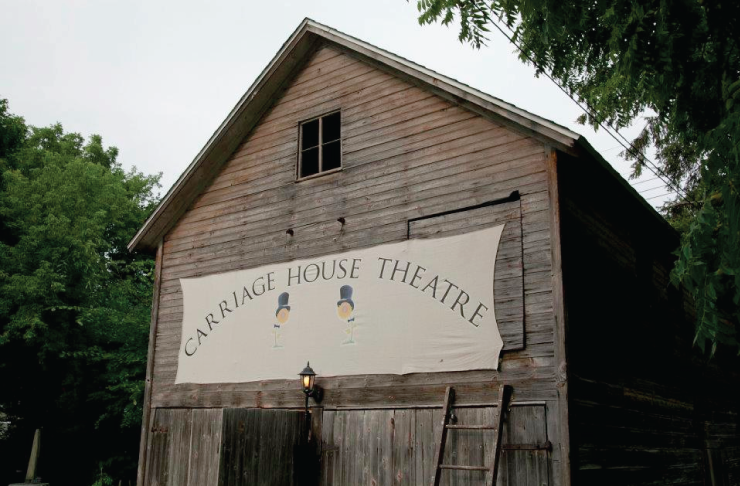
Ann Arbor’s Carriage House will present a variety of theatrical productions this summer.
First up, Ann Arbor Civic Theatre's three improv troupes CSI (Civic Short-form Improv), Dearly Beloved, and Luxury Possum, performing short skits and improv games, and “Whose Line is it, Anyway?”-style games.
The first Carriage House mainstage production will be Shakespeare's Hamlet directed by new Artistic Director Trevor Maher.
Hamlet is immediately followed by Spinning Dot Theater's A Mouth with Flame, an original one-man show by Spinning Dot’s Artist-in-Residence Tae Hoon Yoo that explores history, reliving personal experiences, and finding identity. (This show is aimed at 7 to12-year-olds.)
Carriage House’s second mainstage production will be Photograph 51, directed by Angie Feak, a humorous and moving portrait of Rosalind Franklin, one of the great female scientists of the 20th century, and her fervid drive to map the contours of the DNA molecule.
The season finishes with Spinning Dot’s Only a Day, a thought-provoking play about fox and a wild boar who can’t bring themselves to tell a dayfly that her life only lasts a single day. (This show is aimed at 7 to 12-year-olds.)
Amy Cantú is a Production Librarian at the Ann Arbor District Library.
Ann Arbor Civic Theatre's improv performances: June 17, 18, 24, and 25 at 8:00 pm.
Hamlet: June 30, July 1, 2, 7, 8, and 9 at 8:00 pm; Sunday July 3rd at 2:00 pm.
A Mouth to Flame: July 14-17, time TBA
Photograph 51: July 28, 29 and 30th at 8:00 pm; August 4-6 at 8:00 pm; July 31st at 2:00 pm.
Only a Day: August 11-14, and 18-21, time TBA.
Review: Encore Theatre’s Assassins is Excellent Entertainment and Trenchant History, a Must-See
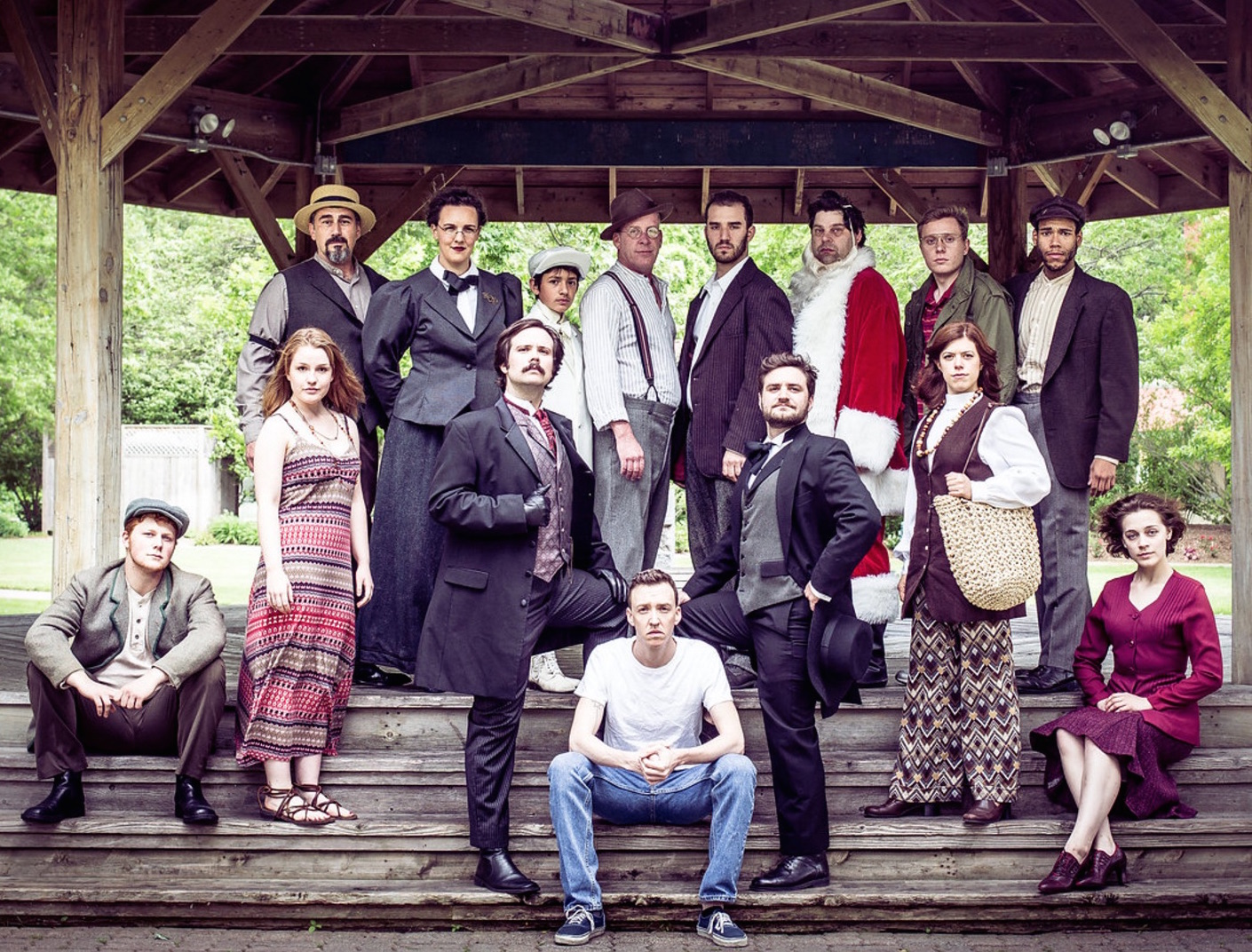
In a time of intense political grievance, the Encore Musical Theatre Company is presenting a riveting, brilliant production of Assassins, a work that uses music, drama, and comedy to explore the darkest side of our democracy.
Presidential assassination is an odd topic for a musical but offers compelling material for lyricist and composer Stephen Sondheim and book writer John Weidman. Since the 1920s production of Jerome Kern-Oscar Hammerstein’s Show Boat, Broadway musicals have dealt with many serious topics, but usually in the context of a romantic core. Assassins is different, a multi-leveled examination of grievance and despair that is at once sympathetic and horrific, funny and sad, maddening and challenging.
Assassins tells the stories and the complaints of presidential assassins and would-be assassins from John Wilkes Booth to John Hinckley. Yet this is no dry history lesson. The stories begin with Booth but are not chronological. The assassins interact across decades, each a separate and distinct personality with similar discontents but varied reasons. And the grim reality is fractured by comedy from musical lilts to slapstick.
Matthew Brennan does triple duty here as director, choreographer, and cast member as our storyteller/balladeer and as Lee Harvey Oswald. In Brennan’s director’s note he writes that this is the show that made him want to be a director and he gets everything right here. He has obviously thought long and hard about the rich possibilities opened up by Sondheim and Weidman, dramatically and musically.
Each part is well cast. They reflect our precise images and ideas of Booth and Oswald while delving deeper into the characters through the precision of Sondheim’s lyrics and music. The other assassins also have their day.
Brennan has that lean chiseled face of Oswald and looks about in that bewildered way that became so well known in the brief time he was on the public stage before his own murder. As the balladeer he is a clear note of conscience but also a fair guide to each grievance.
And who are these dark figures who present their stories, appropriately, on a set designed by Sarah Tanner of the sixth floor of the Texas Schoolbook Depository?
David Moan is a dead ringer for John Wilkes Booth, the suave, handsome matinee idol. He wears the dashing mustache and styled hair but Moan’s face mixes the look of charm and steel that was Booth. He sings in an almost sweet and yet anguished voice as he makes his case and unburdens his agony that “our country is not what it was.” In the final scenes his voice has that rich syrupy southern warmth that must have made Booth the stage star he was, though always in the shadow of his brother Edwin.
Daniel A. Helmer is the funny, chipper, ever optimistic striver Charles Guiteau who assassinated James Garfield. Helmer sings, dances, and clowns and captures every nuance of a man who believed in his deepest heart in the American dream and never understood why he didn’t get his fair share. Helmer has him nailed in his performance.
More pathetic is Samuel Byck, who planned to kill Richard Nixon by hijacking an airliner and crashing into the White House. He was killed before he got off the ground. His story here is told in the recreation of two tapes he made, one addressed to Leonard Bernstein (for whom Sondheim wrote the lyrics to West Side Story) and another to Nixon. Keith Allan Kalinowski gives a shattering performance of a man on the verge of mental breakdown, everything in his life a mark of failure. Kalinowski’s performance is brusque, funny, soulful and full of pathos.
On a more “humorous” note are Lynnette “Squeaky” Fromme and Sara Jane Moore, who in September of 1975 both decided to assassinate the least controversial, blandest president ever, Michigan’s own Gerald Ford in separate attempts. Fromme was as she said lover and slave of Charlie Manson and participant in his crimes. Sara Jane Moore was a scatter-brained, middle-aged housewife who wasn’t sure what she was doing or why.
Carly Snyder as Fromme and Sarah Briggs as Moore bring these characters to life in all their craziness and ineptness. Snyder has an interesting cross generation duet with John Hinckley (James Fischer) justifying her bizarre love for a madman. Briggs is a superb comic, with body motions and facial contortions that reveal the special anguish of Moore’s mental illness.
Dan Johnson plays the angry but personally retiring anarchist Leon Czologz, McKinley’s assassin. He captures the tight bewilderment of a man never at home in America and not really sure why. He speaks and sings poignantly of what it’s like to be on the bottom of the American economic system.
Ari Axelrod brings ferocity to his performance of Giuseppe Zangara, who in the attempt to kill president-elect Franklin Roosevelt killed Chicago Mayor Anton Cermak. His death scene is ferocious but brilliantly undercut by a competing ensemble piece of bystanders who yearn for publicity for “saving Roosevelt.”
Fischer’s Hinckley is a quiet boy man. Fischer is a plaintive suitor to a phantom Jodie Foster. In one of many clever stagings, Hinckley’s pathetic assassination attempt on Ronald Reagan is stylized and highlighted by Reagan’s heroic voice of humor, calmness, and strength.
The music is alternately bracing, lush, and humorous, excellently performed by the orchestra under Tyler Driskill. The ensemble cast is excellent, especially on the multi-voiced final “Everybody’s Got the Right.”
One small glitch was a problem in the sound system but it didn’t distract from an outstanding show.
History often repeats itself, sometimes tragically in the form of assassinations. In a democracy we need and encourage dissent, strong voices with aggressive and sometimes vital complaints. But there is a line where complaint becomes madness and visions of a better day when our country was a better place distort reality. Sondheim and Weidman have given us a history lesson that provokes, amuses, shocks but never gives an easy answer. Encore brings that vividly to life.
Hugh Gallagher has written theater and film reviews over a 40-year newspaper career and was most recently managing editor of the Observer & Eccentric Newspapers in suburban Detroit.
Assassins continues at the Encore Theatre in Dexter at 7 pm on Thursdays, June 23 and 30; 8 pm on Fridays, June 17, 24 and July 1; and 3 and 8 pm on Saturdays June 11, 18, 25 and July 2; and 3 pm Sundays June 12, 19, 26 and July 3. For tickets, call the Encore Theatre Box Office at (734) 268-6200 or visit the website at http://www.theencoretheatre.org/tickets.
Preview: Love's Labour's Lost in the Arb

After reading Station Eleven — the recent sci-fi best seller about a troupe of actors and musicians traveling the dangerous shores of post-apocalyptic Michigan in order to keep culture, most notably Shakespeare, alive — I have a newfound respect for our peripatetic Tree Town tradition that attracts thousands of participants every summer: Shakespeare in the Arb, now in its 16th season.
This year, Kate Mendeloff of the University of Michigan Residential College will direct Love’s Labour’s Lost which she first took up and fell in love with 10 years ago. As the scenes change, performers (students and local actors) as well as the audience will move to various locations in U-M’s Nichols Arboretum, where the setting's natural landscape and pastoral splendor — broken only by the occasional jogger — will provide the perfect backdrop.
Bring a portable lawn chair or blanket. And remember that the stray bug (or two) is but a small thing to endure for the pleasure of experiencing Shakespeare al fresco. Just don’t forget to bring the OFF!
Amy Cantú is a Production Librarian at the Ann Arbor District Library.
Love’s Labour’s Lost runs Thursday-Sunday, June 9-12, 16-19, and 23-25, at 6:30 pm in Nichols Arboretum, 1610 Washington Heights. Tickets go on sale at 5:30 pm the day of each performance. Visit the Matthaei Botanical Garden website for more information, or call 734-647-7600.
Review: Civic's 'Wedding Singer' is an entertaining musical trip to the go-go '80s

A twirling mirror ball fills the Lydia Mendelssohn Theatre with a dazzling display of twinkly stars setting just the right tone for the Ann Arbor Civic Theatre's giddy and highly entertaining production of The Wedding Singer. It's a nostalgic musical trip back to the go-go Reagan years of the 1980s and a search for true love by two lost souls.
The Wedding Singer was a Broadway musical based on the popular Adam Sandler-Drew Barrymore rom-com. The film's writer Tim Herlihy teamed with Chad Beguelin to fit the movie to a theater stage and substitute an '80s Top 40 soundtrack with an original score with music by Matthew Sklar and lyrics by Beguelin. The result is often hilariously funny and sometimes a bit touching, even though we all know how it will end.
The trick for Sklar was to create music that echoes those hits without actually copying them. You'll recognize the inspirations immediately and smile. Beguelin's lyrics effectively capture the schmaltzy side of the era but also excellently parody some of the more strident songs.
Most importantly, the A2CT cast is fully engaged as they romp through several weddings and a bar mitzvah before true love finds its way to a Vegas wedding chapel (replacing a hectic airport scene in the movie and weary travelers with celebrity impersonators). Director Ron Baumanis keeps the sets simple, mobile and interchangeable. The focus is all on the performance of his talented cast.
Chip Mezo is Robbie, the wedding singer, who believes that the happiness he brings to the newlyweds and their guests is better than being a rock star. Unfortunately, it means he is reduced to living in his grandparents' basement. But Robbie believes in love. Mezo is a fine pop singer with just the right amounts of swagger and innocence.
He can do a Billy Joel style riff on "Somebody Kill Me," find the ethnic humor in "Today You Are a Man" and go all mushy on "Grow Old With Me."
The ultimate object of his affection is the sweet, consoling, ever hopeful Julia. Kimberly Elliott gives each of those qualities full play in her fine performance and, of course, adds a bit of goofiness as well. Elliott is a fine singer, whether on a song of longing, "Someday", or on a cheerful song of affirmation, "Come Out of the Dumpster".
The course of true love does not run smoothly. Robbie is in love with Linda, who dumps him early on as a loser who will never be the rock star she deserves. Julia is engaged to a Wall Street investor with a bullying personality and a roving eye. But they have loyal friends who help to steer them in the right direction.
Salina Burke as Linda gets two songs to display her strong pop voice. On "Let Me Come Home" she gets to sing, jump and perform a tasteful strip tease all at once.
Michael Cicirelli is Glenn, Julia's obnoxious boyfriend. He does a fine run down on Wall Street ethics in the song "All About the Green."
Robbie's band mates Sammy and George offer contrast. Sammy is a mullet-haired dude played with easygoing sincerity by Daniel Hazlett.
George is an observant, quietly mocking gay man who wonders at his friend's misplaced optimism. Chris Joseph is a bright, always engaging performer who often steals the show. He is hilarious as he noodles away at a bar mitzvah blessing and brings a bit of Little Richard to a dance with Robbie's forward-looking grandmother Rosie on "Move That Thang." But best of all, his face is a Greek Chorus of commentary on what's going on.
Becca Novak brings another big '80s style voice to the role of Julia's best friend Holly. She takes the lead on the rollicking "Saturday Night in the City" and joins Hazlett on a duet "Right in Front of Your Eyes." Karen Underwood plays Rosie with warmth and humor without overdoing the stereotype.
The solid band under the direction Jim Territo does an excellent job of hitting all the sounds of the '80s.
The ensemble brings those déjà vu weddings to life with some excellent bad dancing, drunken dedications, conga lines, and, as always, tense moments that might lead to a brawl.
This is a happy show. The songs are not very original and that's the point. The story is set in stone at the beginning and that's why it's so appealing. The director and his cast bring it all together into a concoction that is as spritzy and bright as a mirror ball twirling in the night.
Hugh Gallagher has written theater and film reviews over a 40-year newspaper career and was most recently managing editor of the Observer & Eccentric Newspapers in suburban Detroit.
The Wedding Singer continues at the Lydia Mendelssohn Theatre on the main campus of the University of Michigan at 8 pm June 3 and 4 and 2 pm June 5. For tickets, visit http://www.a2ct.org/tickets or call (734) 971-2228.
Preview: 2016 Allied Media Conference: Holistic Solutions for a More Just and Creative World

The awesomely expansive 2016 Allied Media Conference will be held in Detroit this year and aims to “bring together a vibrant and diverse community of people using media to incite change: filmmakers, radio producers, technologists, youth organizers, writers, entrepreneurs, musicians, dancers, and artists.” The content of the conference is diverse too, including workshops, shows, and dance parties.
I interviewed Morgan Willis, Program Director of the AMC, about what we can expect from this year’s conference.
Q: You talk about AMC as a collaboratively-designed conference. Can you give a sense of the number and scope of collaborators who have worked on this year's event?
A: The Allied Media Conference is created each year through the passionate contributions of hundreds of coordinators, presenters, and volunteers. The AMC organizing process has been developed from an iterative cycle of feedback and learning between AMC participants and organizers. Through trial and error, survey and response, the organizing process is a continuous work in progress.
This year we have 60+ volunteer coordinators of the 28 different tracks, practice spaces, and network gatherings at the conference. We also have approximately 10 full time and part time staff members that work on the conference, as well as an advisory board of nine intergenerational, long-time AMC participants. We share the conference organizing process through our zines “How We Organize the AMC” and the “AMC Presenter Guidelines.”
Q: Who do you hope to see at AMC?
A: The AMC is a conference that is excited to center participants who live at the margins of conventional conference spaces: immigrants, youth, elders, black and brown folks, queer folks, parents, and others, while remaining open to our vast network of participants across all identities and spectrums. We hope to see first time AMCers, returning participants, Detroiters and media-makers from all over the continent.
Q: How does being situated in Detroit influence the conference?
A: This year will be the AMC’s 10th anniversary of being held in Detroit! Detroit is important as a source of innovative, collaborative, low-resource solutions. Detroit gives the conference a sense of place, just as each of the conference participants bring their own sense of place with them to the conference. Detroiters are also a significant percentage of our coordinators, participants, presenters and attendees.
Our offsite tours and field trips allow participants to see a variety of grassroots media-based organizing initiatives and experience different parts of the city that they may not know about or have access to. One of the most popular tours that is back this year is “From Growing Our Economy to Growing Our Souls” which explores Detroit history and emerging visionary organizing, led by Rich Feldman of the Boggs Center. Other tours will explore urban farming, “green” infrastructure, the Motown United Sound Recording Studio, and more unique places and initiatives in Detroit.
Q: Any tips for navigating the conference for newbies? How about return visitors?
A: As the AMC continues to grow, we hope to ensure that it is a welcoming space for first timers while also cultivating the intimacy and network building that many returning AMCers value so much. This year we will be offering “homeroom” sessions for first timers, hosted by returning AMCers who will help orient first timers to the AMC and offer best practices for navigating through the conference. We will also be sharing a list of “10 Things to Know as an AMC First Timer” on our website (alliedmedia.org/amc) so stay tuned!
One thing we always emphasize to both newbies and returning visitors is to plan your schedule in advance. We just released the online schedule and we highly recommend that attendees read through the 250+ sessions to get a feeling for what you’re most interested in before you arrive. This will also help you identify people and organizations you’d like to connect with so you can grow your network and build long lasting relationships.
Q: What are you personally looking forward to in this year's conference?
A: The Opening Ceremony is always a highlight! This year, through a partnership with the Detroit Institute of Arts museum, we will host the Opening Ceremony inside the beautiful Detroit Film Theater, which has double the capacity of our previous venue. The event is produced by Tunde Olaniran and will bring together performers, activists, and live music as a celebration of the powerful wave of creative movement-building happening across the country.
I’m also especially excited to see the evolution of workshops from last year into tracks (series of multiple workshops) this year, like the “Black Death Mixtape” session, which has expanded into the “Black Survival Mixtape” track. And I love the return of tracks and network gatherings focused on important topics such as climate resilience and disability justice.
We will also be hosting several community dinners this year, which are a way for attendees to meet and connect over affordable, delicious, and locally sourced food. I’m especially looking forward to the Saturday night community dinner, “Bil Afiya: A Community Feast” at Cass Corridor Commons!
Anna Prushinskaya is a writer based in Ann Arbor, Michigan.
The 18th Allied Media Conference takes place June 16 - 19, 2016. AMC offers housing, registration, childcare information, and more online. Registration is on a sliding scale from $75-$500.
Preview: Redbud Productions Presents 'Luna Gale'

Redbud Productions presents Pulitzer Prize Finalist and the American Theatre Critics’ Association’s 2015 Best Play of the Year, Luna Gale, at the Kerrytown Concert House next weekend.
In this tale of love and betrayal directed by Tim Grimes, social worker Caroline (Loretta Grimes) meets two young addicts (Krystle Dellihue and Liam Weeks) accused of neglecting their child. But when she places their infant daughter in the care of the girl’s mother (Deb Wood), Caroline also ignites a powerful conflict that exposes a shadowy past and forces her to make a risky decision - with potentially disastrous consequences.
Playwright Rebecca Gilman is the recipient of a Guggenheim Fellowship and The Evening Standard Award for Most Promising Playwright, and her previous plays have appeared regionally and abroad. The Los Angeles Times cites Luna Gale as “One of this year’s most valuable additions to American drama” and The Hollywood Reporter calls it “An outstanding new social drama about parenting that stands as a rich contribution to the American theater canon.”
Amy Cantú is a Production Librarian at the Ann Arbor District Library.
Luna Gale runs Thursday, June 2 - Saturday, June 4 at the Kerrytown Concert House, 415 North Fourth Avenue, Ann Arbor, MI. General seating tickets: $20 for adults; $15 for students (limited front row café table seating for groups of 2 - 3 for $25 a seat; special group rate general seating price of $15 per ticket for groups of 10 or more). For reservations, call Kerrytown Concert House at 734-769-2999 or visit http://kerrytownconcerthouse.com.


































